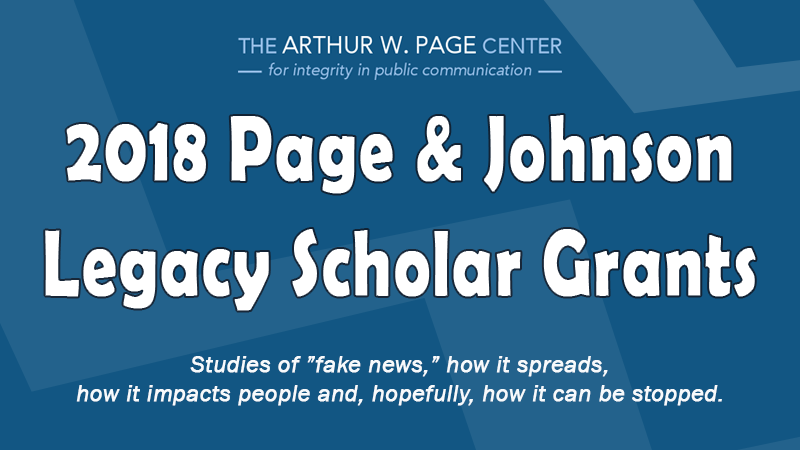Page Center funding research that targets ‘fake news,’ other communications issues
April 11, 2018 • Jonathan McVerry

With misrepresentation and half-truths plaguing public discourse these days, the Page Center identified a need to better understand the nature, dynamics and consequences of the “fake news” phenomenon as a contemporary form of misinformation. The Center will fund 11 research projects that study “fake news” from a number of perspectives, as well as seven other studies that tackle a variety of vital communications topics.
Led by scholars from nearly 25 universities, the research projects examine specific areas relevant to public communication today. Areas include misinformation on social media, the dynamic flow of fake news, internet governance and fact-checking, among others. Results from the studies will be featured in an edited book and as white papers.
This wave of funding is a part of the Center’s Page/Johnson Legacy Scholar Grants. Each year the Page Center recruits scholars to pitch research ideas that may answer difficult questions that both researchers and practitioners face in the communications field.
The “fake news” call was led by Page Center senior research fellow George Anghelcev, an associate professor of journalism and strategic communications at Northwestern University in Qatar.
“When it comes to public communication, there isn’t a timelier and more influential subject than ‘fake news,’ which affects just about everyone in the world,” said Page Center director Denise Bortree. “’Fake news’ can be defined in so many ways. Learning from its past, identifying its effects and monitoring it from a number of perspectives will allow us to get a grip on its consequences, and provide practical ways to combat it.”
Bortree led the open call, which will examine a number of topics, including the idea of corporate purpose and corporate social responsibility. Corporate purpose has been a concept used around companies recently as leaders attempt to identify their organization’s core mission and role in a number of local and global contexts.
Since its founding in 2004, the Page Center has become an international leader in research on ethics and integrity in public communication. The Center has funded nearly 250 scholars and awarded more than $800,000 in research funding. The Page/Johnson Scholar Grants are awarded annually and address a relevant issue affecting public communications. Past calls have examined digital media, sustainability, and advocacy, among others.
Funded ‘fake news’ research projects
“Combating the spread of fake news and misinformation on social media”
Leticia Bode, Georgetown University; Melissa Tully, University of Iowa; and Emily Vraga, George Mason University
“Internet governance and the priming of (fake) news content for automated media”
Christopher Cox, Georgia State University
“Truth-telling trumps fake news: Successfully safeguarding the company reputation”
Michele Ewing and Cheryl Ann Lambert, Kent State University
“Public relations students’ attitudes and aptitudes in media literacy and ‘fake news’: An analysis of future PR professionals”
Jami Fullerton, Oklahoma State University; Alice Kendrick, Southern Methodist University; and Lori Melton McKinnon, Oklahoma State University
“We the people: Fake news dissemination as a byproduct of citizen’s civic practices”
Toby Hopp, Patrick Ferrucci, and Chris Vargo, University of Colorado at Boulder
“Understanding public relations roles as the ethics counsel in the age of fake news”
Mi Rosie Jahng, Wayne State University and Hyunmin Lee, Drexel University
“How can we prevent fake news consumption? Exploring framing effects for fact-checking messages”
Hernando Rojas and Kwansik Mun, University of Wisconsin at Madison
“Emotions as catalyst for spreading misinformation: the case of ‘Fake News’”
Sela Sar, University of Illinois at Urbana-Champaign
“Examining the effects of fake news on social media: The role of fake news sources, fake news correction sources and rebuttal messages”
Michail Vafeiadis, Auburn University, and Anli Xiao, Pennsylvania State University
“The visceral notice of fake news: Effects of warning labels on Facebook consumers’ attention and emotional responses to online misinformation”
Bartosz Wojdynski, University of Georgia
“Comparing the transmission dynamics of real news vs. fake news: A dynamic network analysis of the Zika epidemic on Twitter”
Qian Xu, Elon University, and Shi Chen, University of North Carolina at Charlotte
Funded ‘open call’ research projects
“The effects of self-construal on green CSR perspectives in the U.S. and India: The moderating roles of environmental consciousness”
Nandini Bhalla, University of South Carolina
“A learning-based model of transparent communication effectiveness”
Toby Hopp and Jolene Fisher, University of Colorado at Boulder
“Co-creation of shared value through participatory corporate social responsibility”
Sun Young Lee, Texas Tech University
“Can employees increase trust in CSR initiatives? A cross-national study”
Geah Pressgrove, West Virginia University; Carolyn Kim, Biola University; and Cristobal Barra, Universidad de Chile
“Is mission driven more motivating than profit driven? An examination of bike sharing programs”
Kim Sheehan, University of Oregon, and Kati Tusinski Berg, Marquette University
“Understanding native communication of corporate social responsibility (CSR)”
Linwan Wu and Holly Ott, University of South Carolina
“Moment of truth: Understanding corporate rumors and the psychology of rumor spread on environmental issues via social media”
Fan Yang, University of Albany, and Holly Ott, University of South Carolina.

